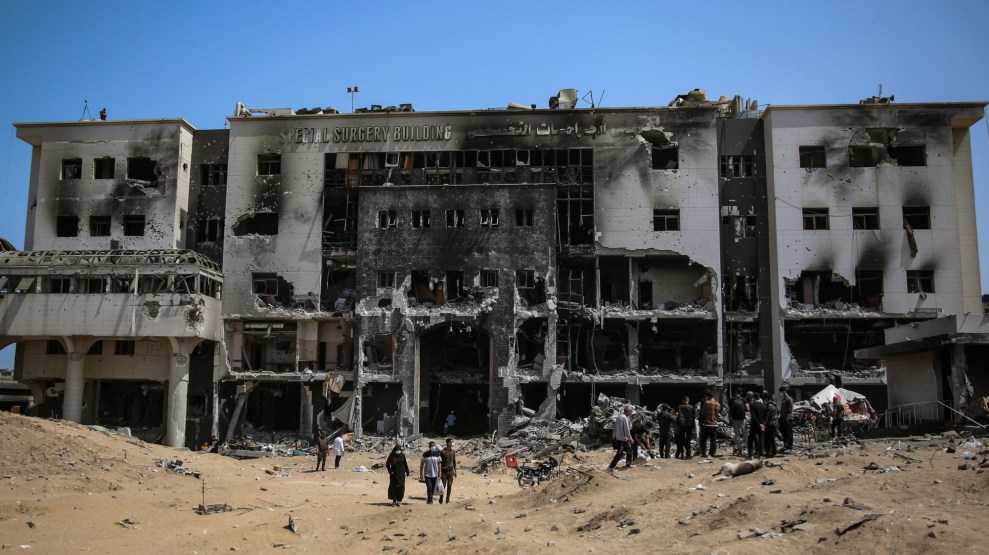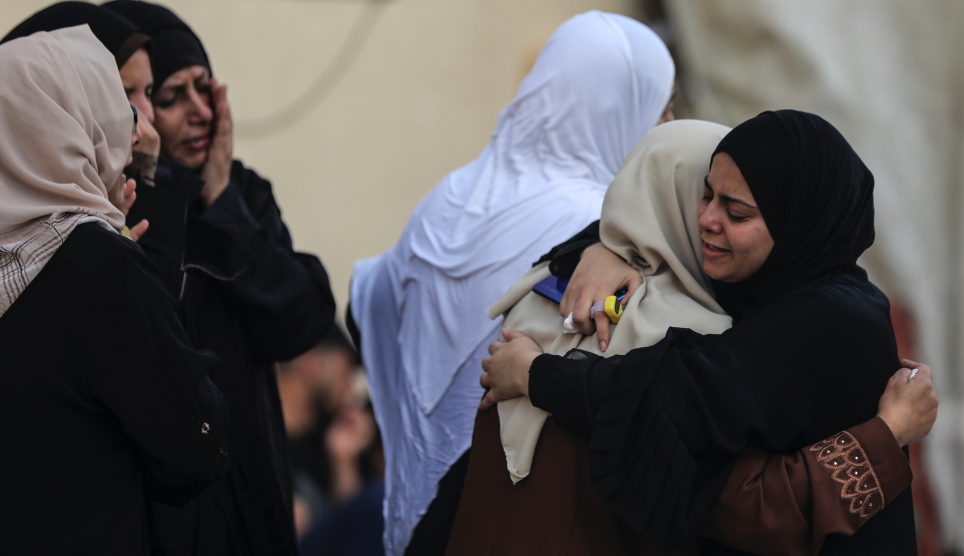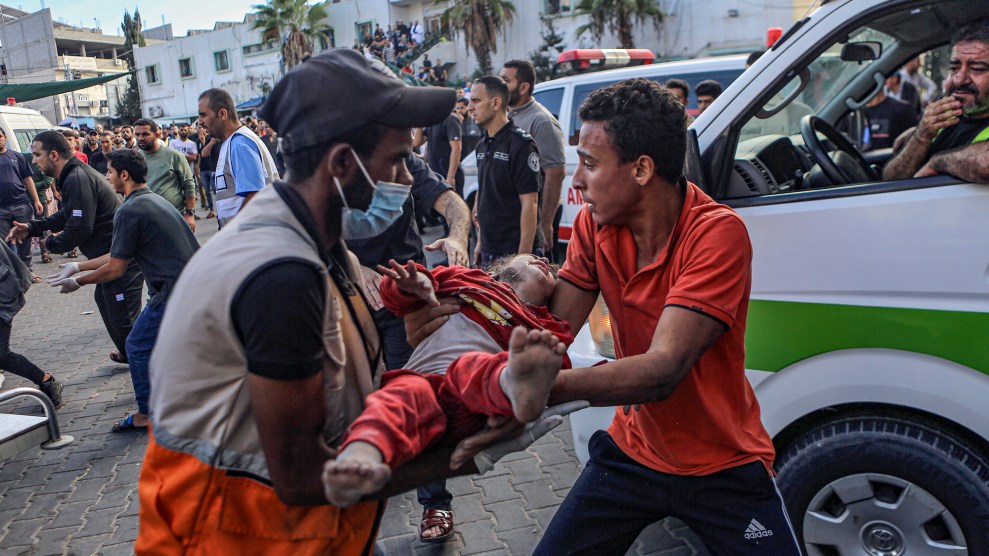The car in front flashes its hazard lights, a signal to alert drivers that there is an Israeli military checkpoint ahead.
Niveen Draghmeh sits up a little straighter, her medical ID clasped in her hand. Just a week earlier, her husband was taken out of his car and beaten by two Israeli soldiers at this very same checkpoint. It was not the first time that had happened to him on this stretch of road outside the northern West Bank city of Nablus. He is a nurse, working in the center of Nablus, where 35-year-old Draghmeh has also worked as a midwife for the past 13 years. The couple juggle shifts so they can take turns looking after their three children. Their youngest, 6 months old, was born on the maternity ward in Rafidia Surgical Hospital, where Draghmeh works.
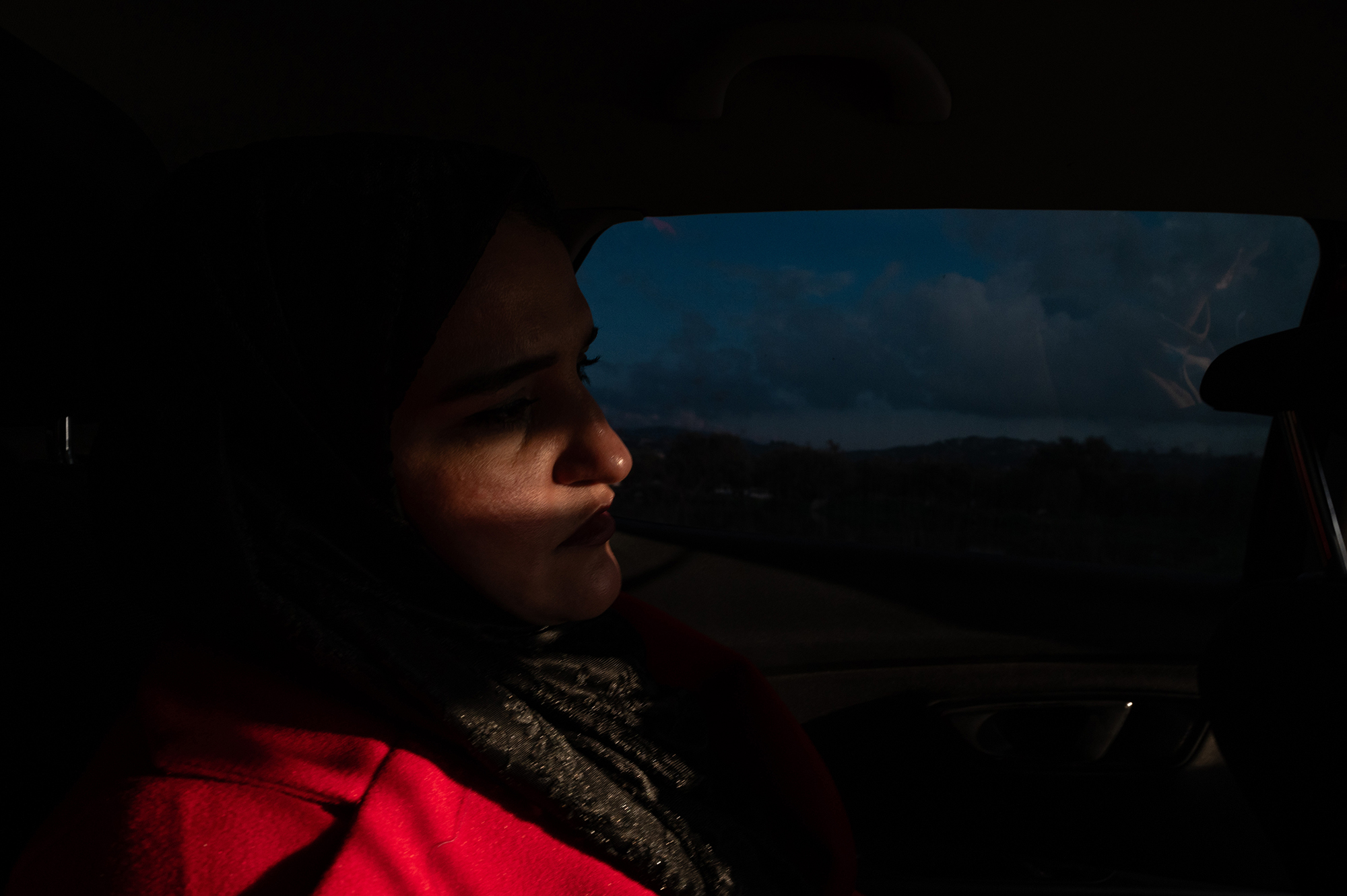
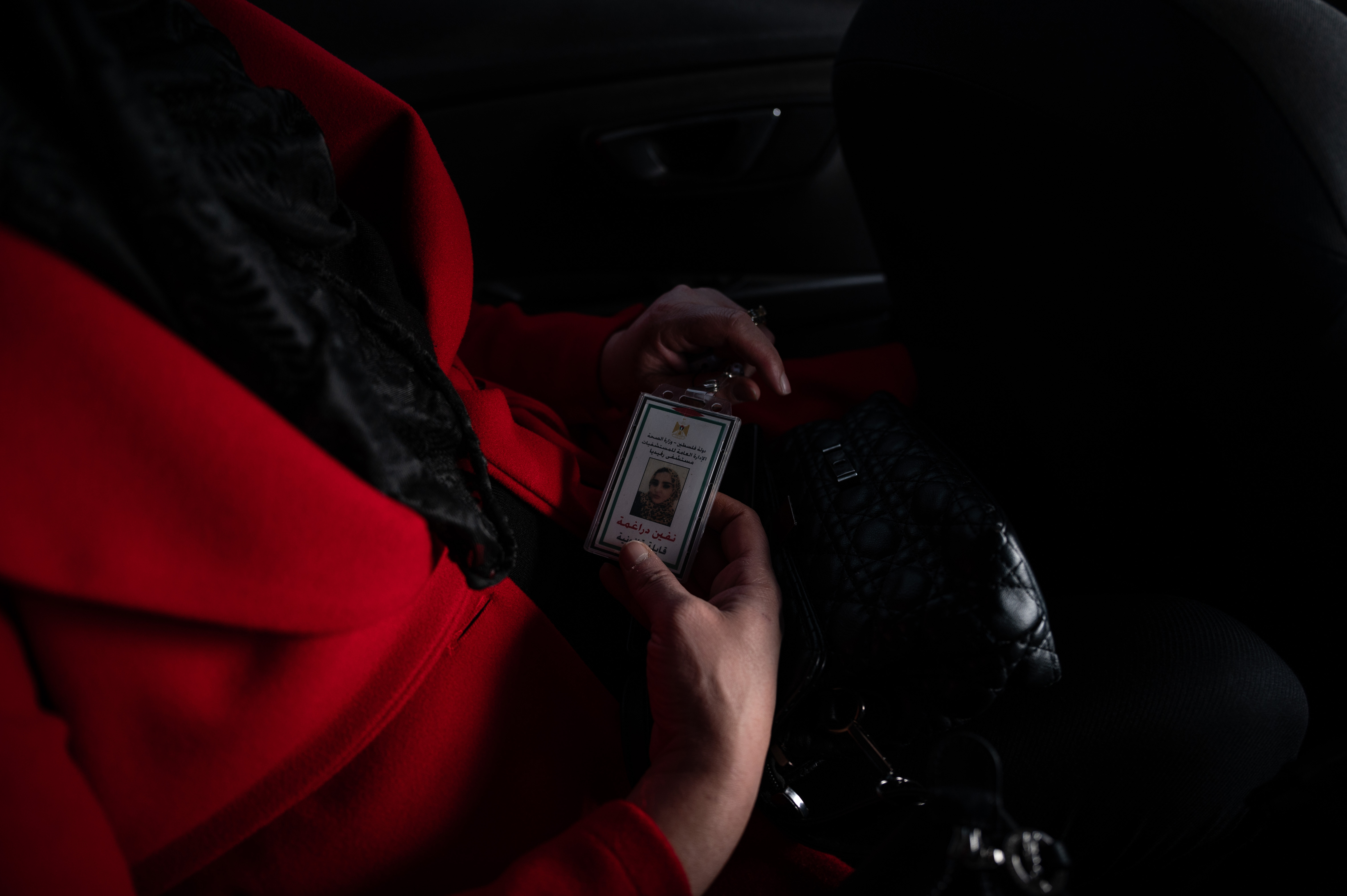
Draghmeh is on her way to her family in her hometown of Beita, about 8 miles southeast of Nablus, after a double shift on one of the busiest maternity wards in the West Bank. Since October, the length of the journey has ballooned to between two and three hours, as the number of Israeli security checkpoints and blockades that dot the West Bank has multiplied. With the travel time and risk to the safety of the taxi driver she hires increasing, the cost of the trip has skyrocketed to the equivalent of $20 a day. It’s money that she just doesn’t have.
The car creeps forward over the potholed road, and Draghmeh’s hands quiver as the checkpoint comes into view. She is mumbling under her breath as she mentally prepares answers, ready for the soldiers’ questions.
Today, she is lucky. As we reach the front of the line, the soldiers at the checkpoint decide to break for food, and the car slides through. Draghmeh’s relief is palpable. “When I get home safely and see my husband and hold my children, my stress begins to leave me, but it’s only for a second,” she says. The worries flood back as soon as her husband leaves for his own shift at the hospital.
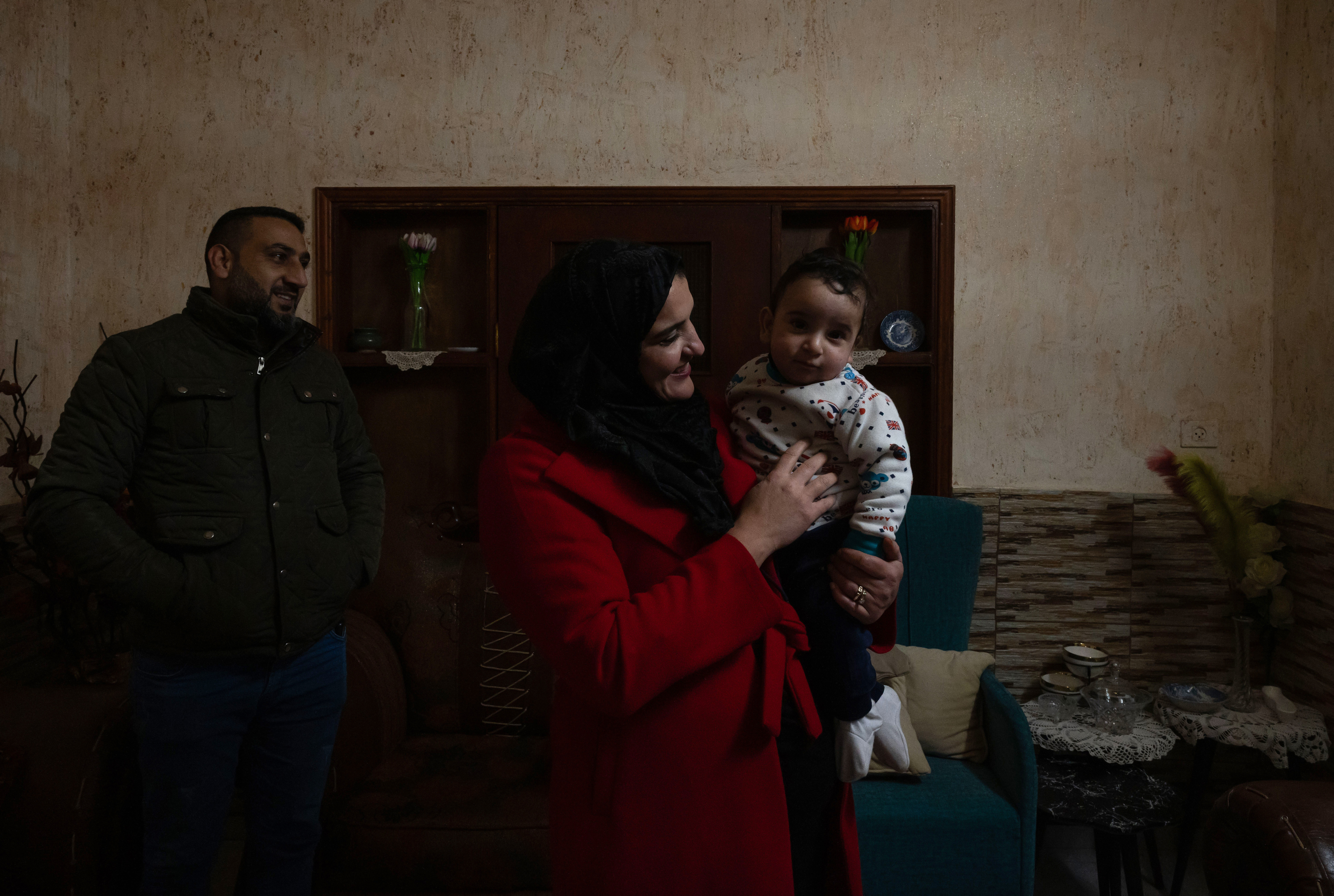
Every day, Palestinian midwives like Draghmeh make the long and unpredictable journey to and from work, not knowing whether they will make it safely or see their children again. In February, I traveled across the occupied West Bank to speak to 28 midwives on 11 maternity wards in the cities of Ramallah, Nablus, Hebron, Jenin, and Tulkarm. All of them have faced significant disruptions to their work since October 7, as both they and their patients struggle to reliably access health care facilities.
Long before the war, Palestinians in the Israeli-occupied West Bank dealt with severe restrictions on their freedom of movement. Across the nearly 2,200-square-mile territory, a web of roads connects the growing number of Israeli settlements, while Palestinian villages are caught in the middle, left unprotected and unconnected, their only access to one another through a maze of meandering dirt roads that can be closed by Israeli forces at any time and without warning. As of 2023, the United Nations Office for the Coordination of Humanitarian Affairs had counted more than 600 obstacles to movement in the West Bank, including checkpoints staffed by Israeli forces or private security companies, roadblocks, gates, and other barriers like mounds of earth and trenches.
Since October 7, Israel has dramatically increased the number of new checkpoints and road closures. In the 10 days following Hamas’ attack, the Israeli army erected more than 140 new checkpoints and obstacles on West Bank roads, according to a report published by the Applied Research Institute–Jerusalem. Israel has also imposed curfews in parts of the West Bank, which have prevented many women from reaching a hospital in time to give birth, resulting in a considerable increase of childbirth at home.
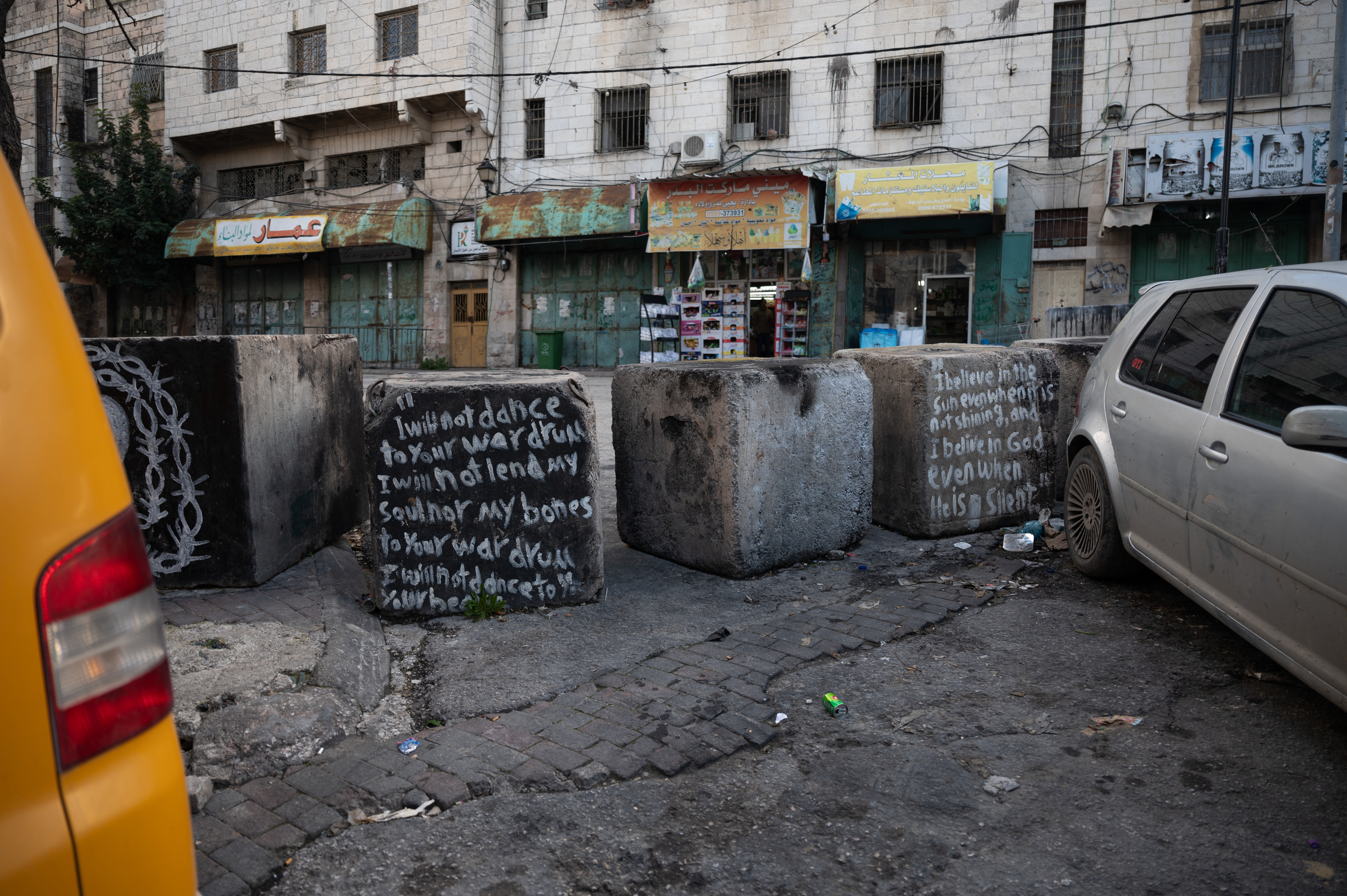
In addition, the past eight months have seen an unprecedented rise in Israeli attacks on Palestinian health workers—not only in Gaza, which is facing a maternal health crisis of its own amid the collapse of its hospital system—but also in the West Bank, where the World Health Organization reports that there have been more than 360 attacks on health care staff and facilities since the beginning of the war. Israeli forces have blocked ambulances from reaching critically wounded people, sometimes stopping and searching them. Medical staff have been targeted inside the hospitals where they work, stopped at checkpoints, harassed, beaten, and detained for hours. A total of 58 health workers have been detained, 10 have been killed, and 62 have been injured, according to a WHO report from February, and there have been 187 reports of force used toward health teams. More than 200 ambulances have been attacked.
All the midwives I spoke with say they travel to and from work in taxis or buses because they feel safer than using their own cars marked with medical passes.
“It doesn’t matter that we are doctors, nurses, midwives, paramedics…our medical cards mean nothing,” Draghmeh tells me. “This is our life. We have no safety. We are truly under attack here, first because we are Palestinian and second because we are health care workers.”
Nablus
The maternity ward at Rafidia Surgical Hospital in Nablus is an ecosystem of its own. Here, the smell of bleach and blood is mixed with shouts of joy and pain. This morning, a family comes in, led by the soon-to-be grandmother. All her children were born here with the assistance of the same midwife, Hala, and now her daughter Chadijah will give birth to her eighth child with Hala’s help again.
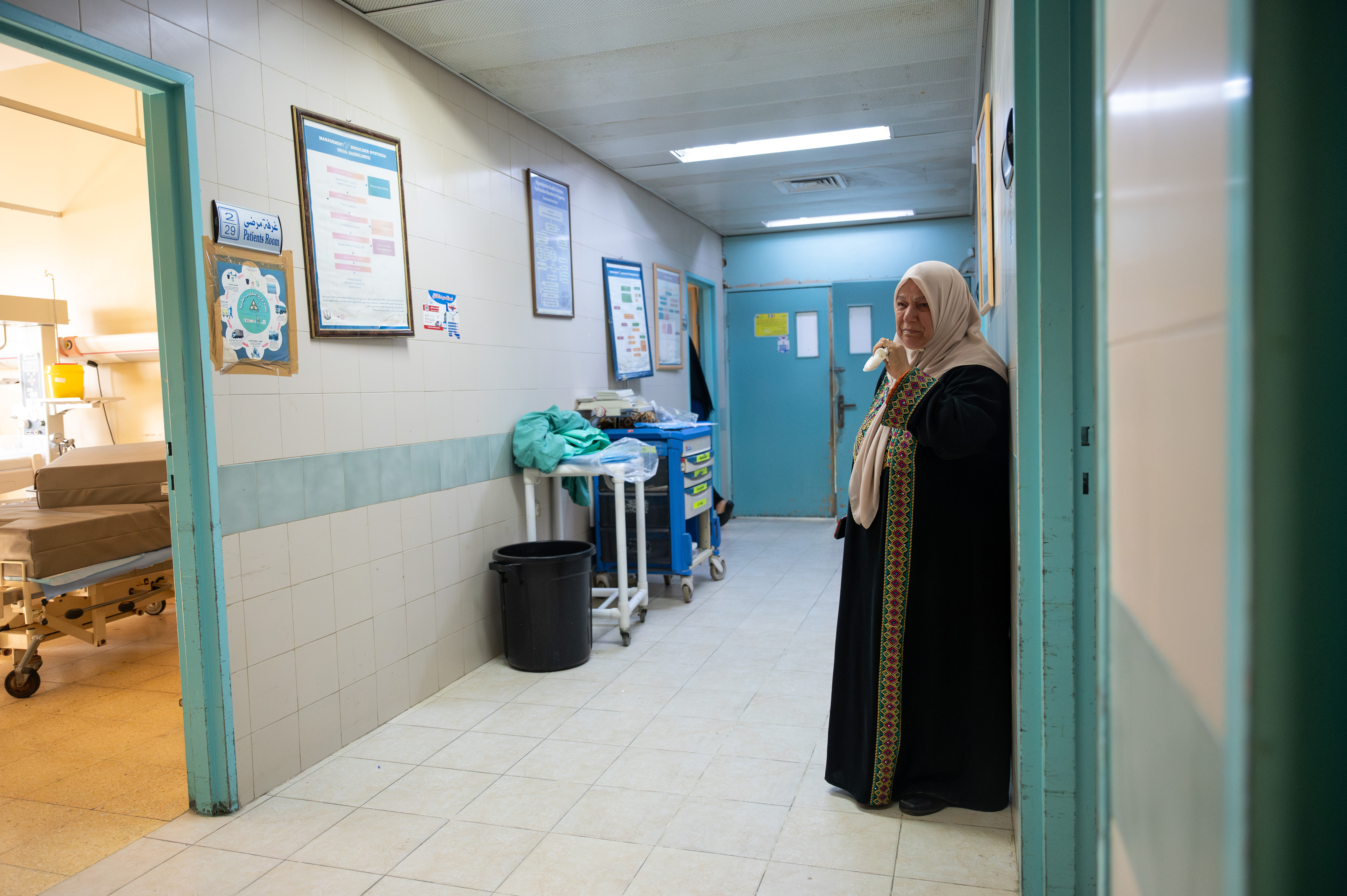
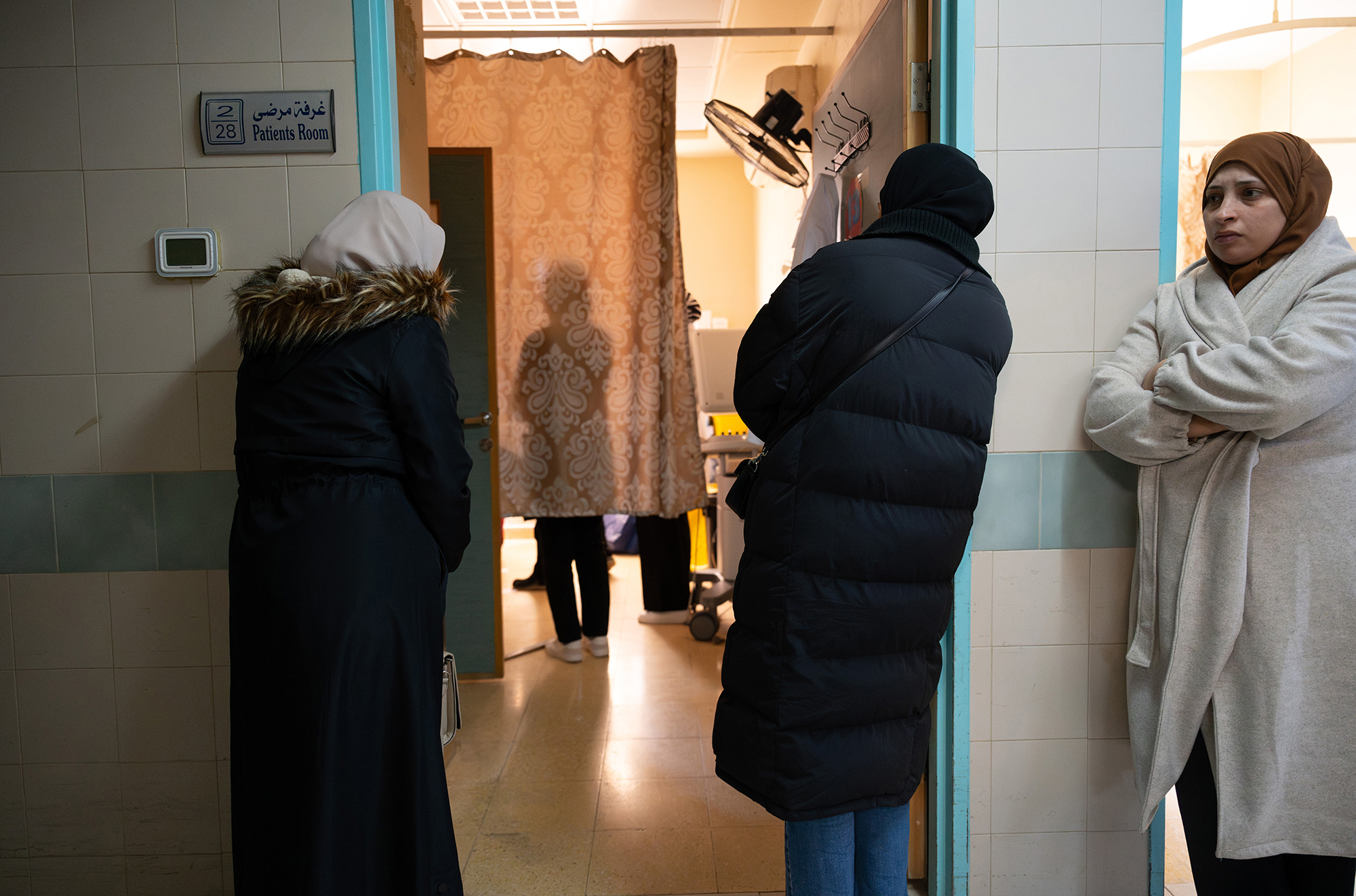
The delivery room is static with nerves, and every sound is magnified, from the reassuring whisper of Chadijah’s sister to the screams from a group of midwives huddled around her, pushing, to the grandmother outside in tears humming a tune to calm herself.
Suddenly, the silence and trepidation of worried family members are replaced by the roaring cry of their new baby.
Ayah has arrived.
But the joy is quickly marred by worry about the future. Even as the family celebrates the safety of Chadijah and little Ayah, they begin discussing the safest way to get the baby home.
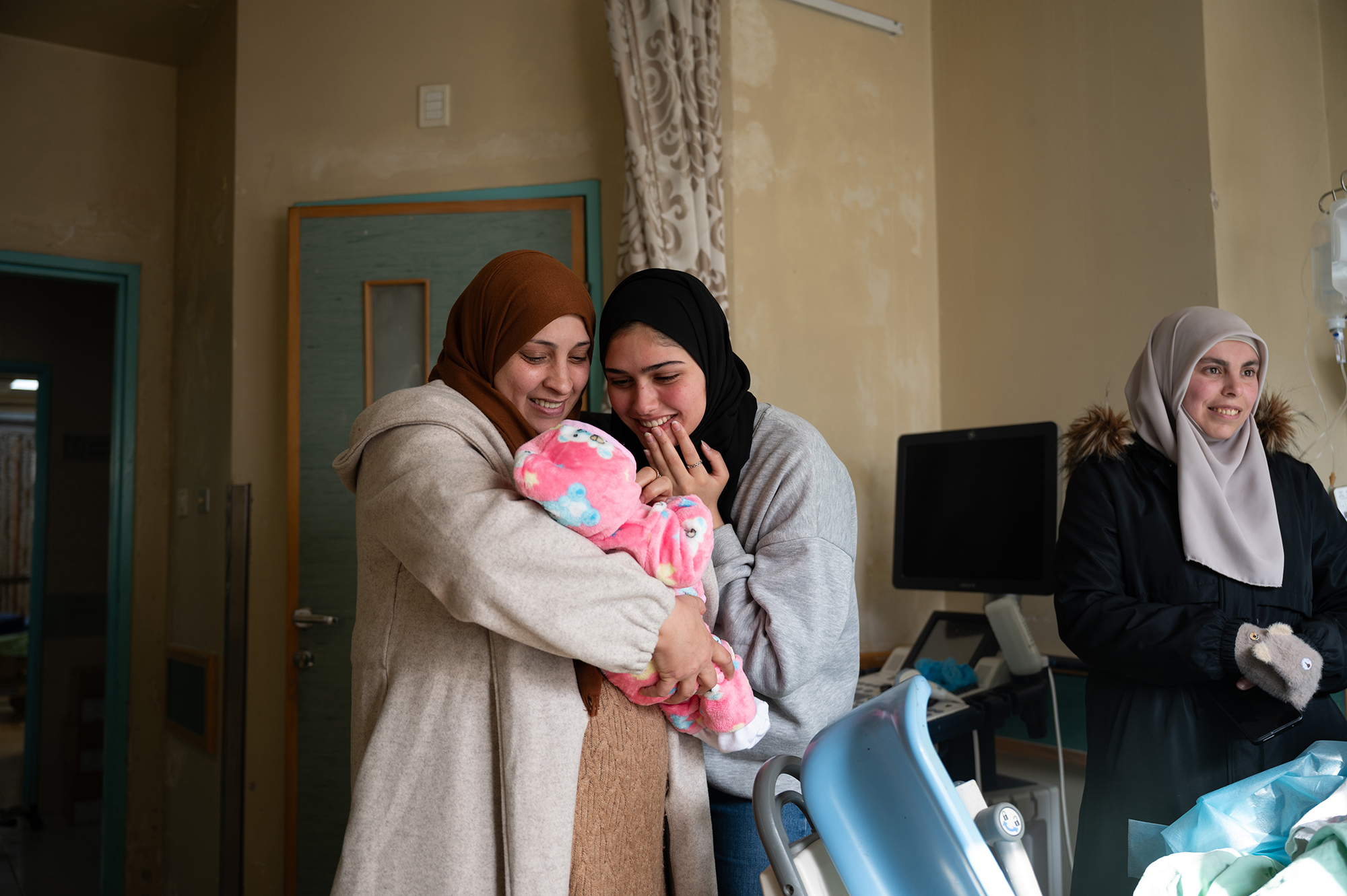
As Hala tends to the new baby, Draghmeh prepares the bed for the next mother-to-be. The midwives have built a close-knit community amid the chaos and uncertainty of life on the maternity ward. Draghmeh’s colleagues were there for her when her 25-year-old brother was shot and left partially paralyzed by Israeli soldiers. When the ambulance bringing her mother to the hospital was stopped at the checkpoint, it was her colleagues who went to help her. Today, Draghmeh is there for her colleague Majida, also a midwife at Rafidia hospital, who asks Draghmeh to wheel her to the operating theater where she will have a cesarean section for twin boys. Six months earlier, Majida had delivered Draghmeh’s son.
Beyond medical needs, the maternity wards offer a safe space for the women—many of whom have lost husbands, fathers, brothers, and sons to the conflict—to share their feelings and process trauma. “So much more than just health care is at risk with the situation we are in now,” Draghmeh says.
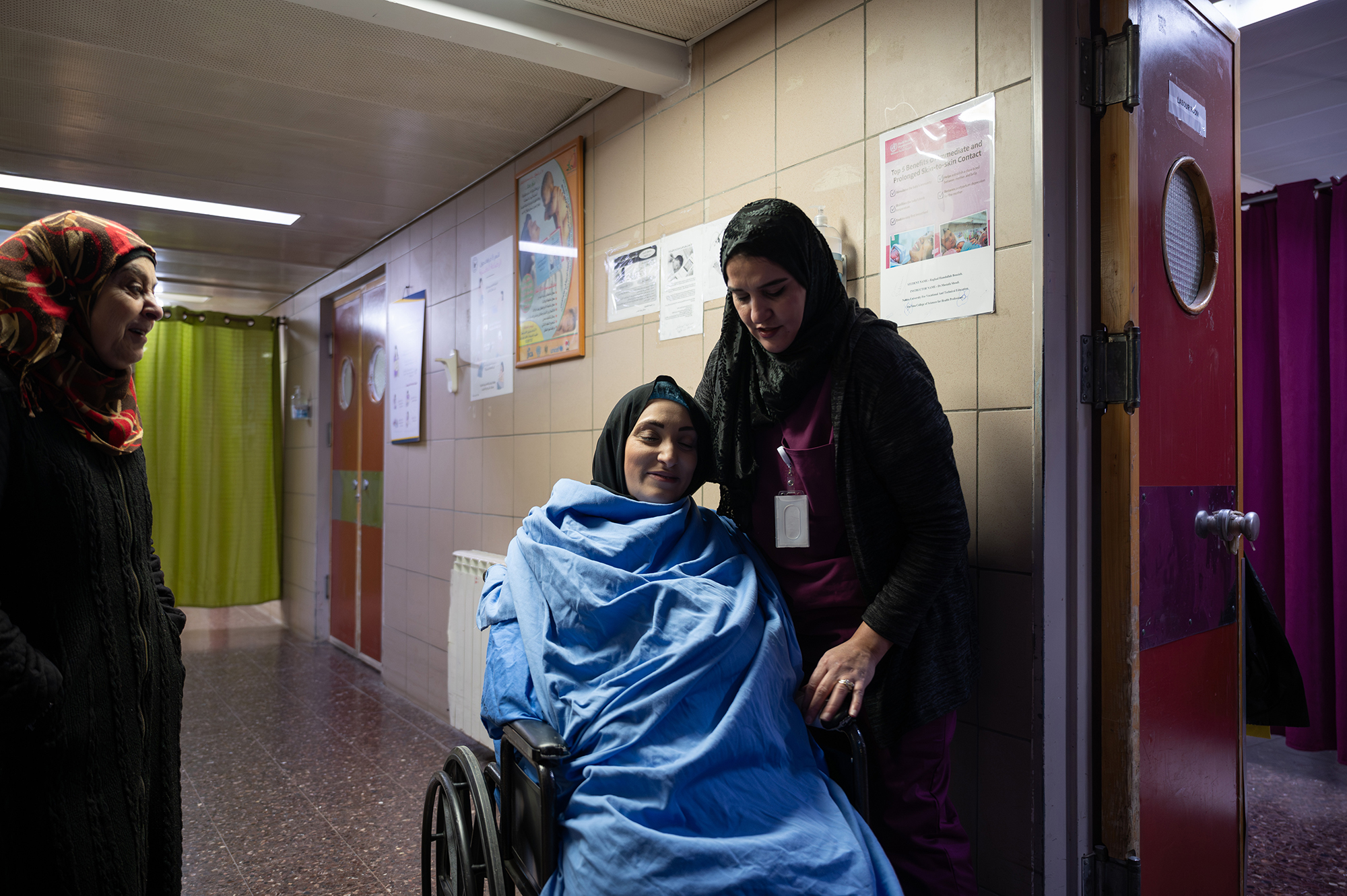
Adding to Draghmeh’s stress, neither she nor her husband have received their full salaries for months now. As part of a 1994 economic deal, Israel collects taxes for Palestinians and is supposed to transfer them each month to the Palestinian Authority, which pays the salaries of public health workers like Draghmeh. But for years, Israel has used the tax revenue as a political bargaining chip, and since the start of the war has been refusing to hand over the portion of tax revenues allocated to Gaza. In protest, the Palestinian Authority in February refused to accept any tax revenue at all. That lack of tax revenue, combined with the drying up of foreign donor aid to the West Bank over the years, has led to a fiscal crisis for the Palestinian Authority.
Dr. Hadeel Yousif Masri, head of the Women’s Health and Development Unit in the Palestinian Ministry of Health, says that in November 2021, all public employees, including Ministry of Health workers like Draghmeh and her husband, began receiving only 50 to 70 percent of their salaries. Since October 7, the situation has worsened, she says, with some employees not being paid for months now. “Employees are drowned in debt,” Masri says. “Many cannot afford to go to work,” because of the high cost of transportation. As a result, most employees now only work two or three days a week. While health workers try to do their jobs to the best of their abilities, Masri says that the reduced working days are heavily affecting the access and quality of health services in the West Bank.
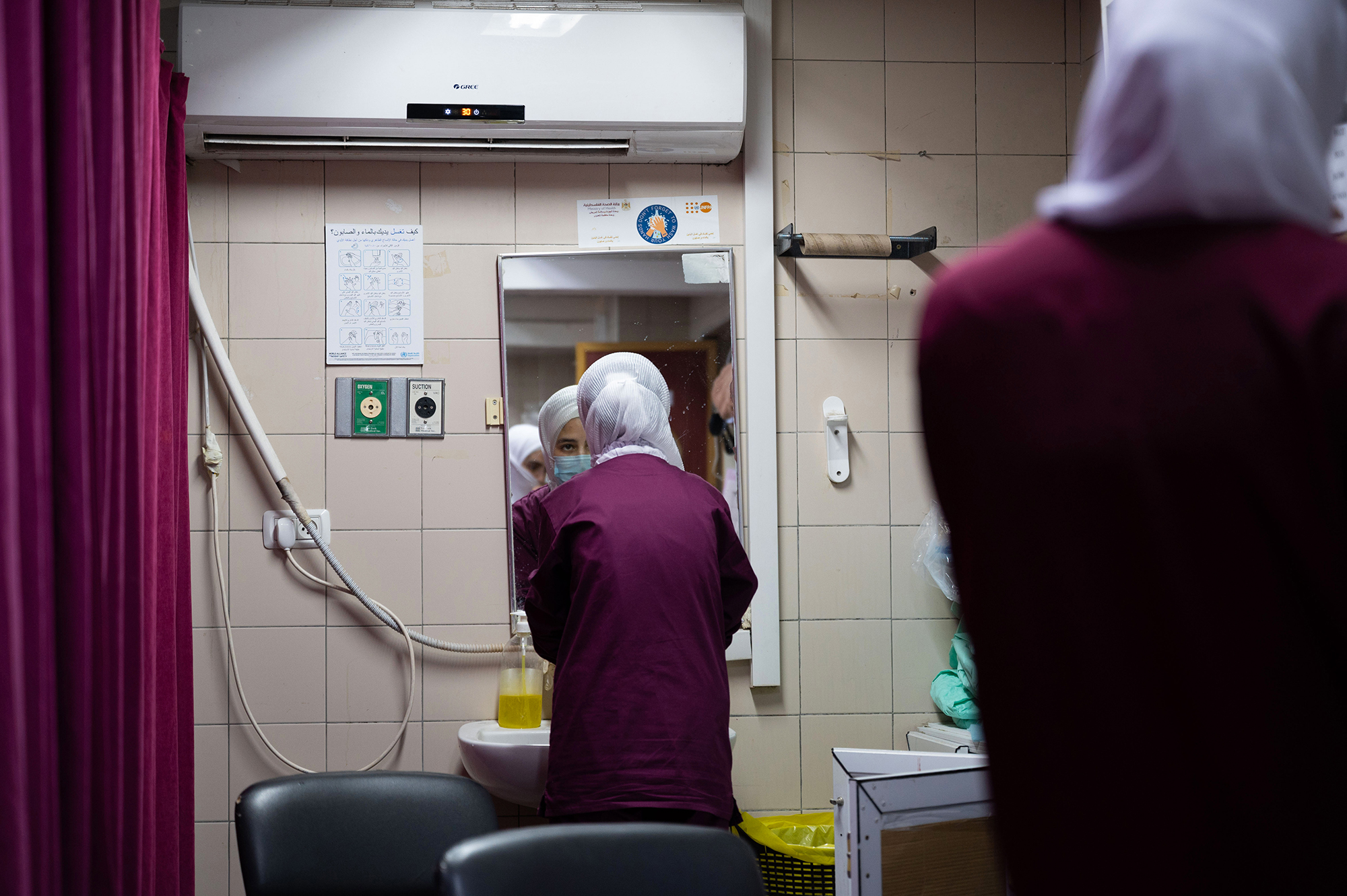
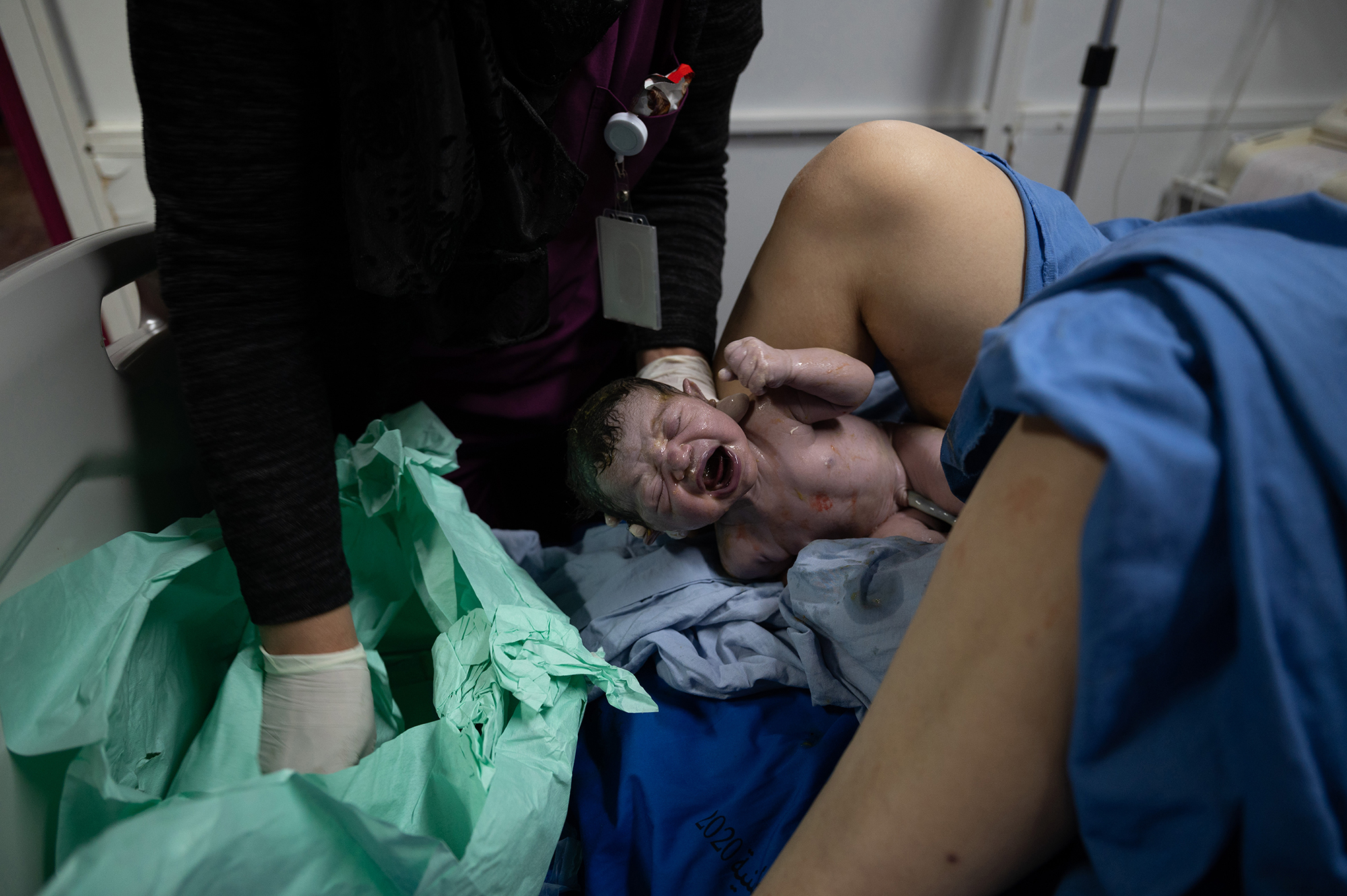
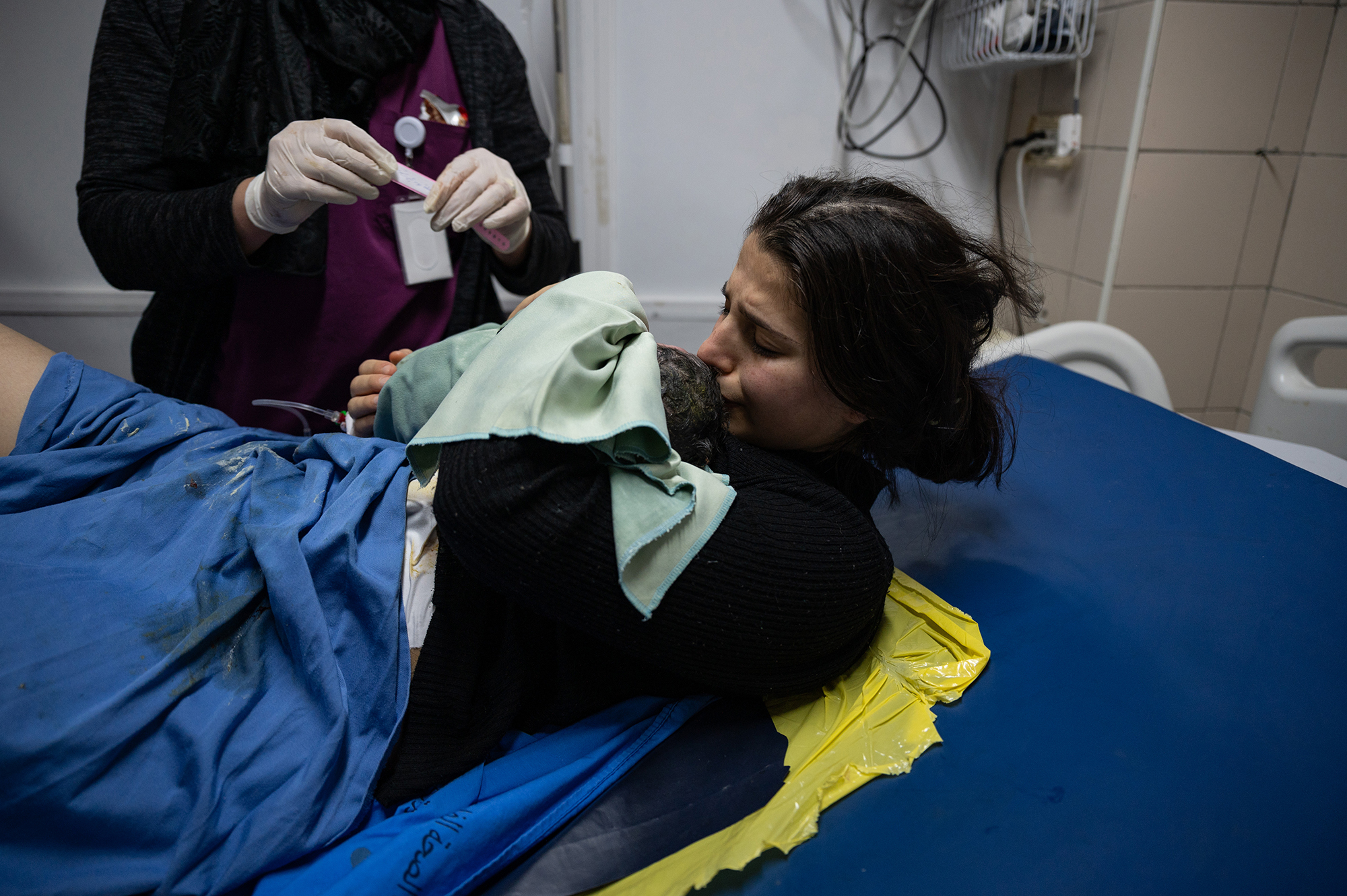
Like Draghmeh, all of the midwives I met were married to nurses, doctors, or paramedics. “We can relate to one another, the fulfillment of the job, the pressure of it, but also the stress of the situation we are in,” Draghmeh says. But that connection also comes with a heavy burden: Now many couples are struggling to support their families without pay.
Ramallah
It’s 8 a.m. on a Thursday in the village Beit Rima, and Dalal Naal Rimawi is starting her long journey to work at the Palestine Medical Complex, a hospital in Ramallah, where she’s worked as a midwife for the past nine years. As she enters the car, her husband tells the driver which roads are open as of 30 minutes ago—he works as a nurse, and another doctor had called to update him on the route.
It was after Rimawi had a gun pointed in her face by a soldier that she stopped taking her own car to work, switching to taxis and buses. “Since I became a mother, I have found it more stressful going through the checkpoints because now my husband and I have a child to think about,” she says. “One of us has to make it home safely.”
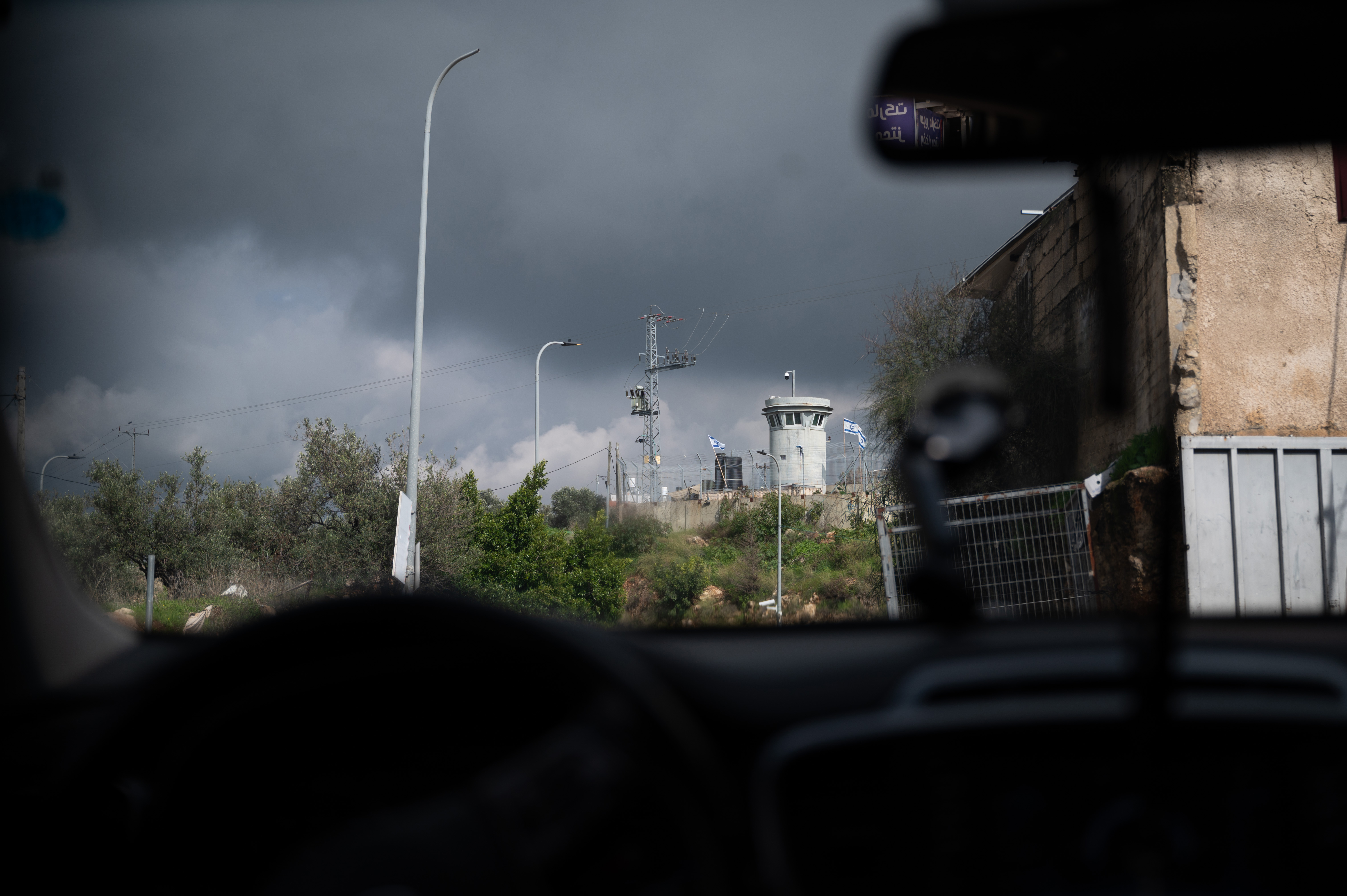
Rimawi’s commute used to be a 20-minute trip on a main road that leads to Ramallah. But today we are driving on rambling back roads through six Palestinian villages and two checkpoints just to access that main road. The narrow roads are not controlled by Israeli forces, but if the army comes into these villages and creates new checkpoints, the whole route will change again. With new checkpoints around her village, the journey can now take upward of three hours and is triple the price it used to be.
As we turn onto the main road, an Israeli army jeep moves into the middle of the road behind us, blocking it. “That’s it. The road is closed now,” Rimawi says. “It’s just three soldiers, but they have the ability to leave me sitting for hours, and this is directly affecting my work and mothers’ safety.”
Rimawi says that even before the war, the unpredictable road closures meant that staff could not reach the hospital for their night shifts, so they had sometimes started taking on double shifts to cover for their colleagues who couldn’t make it to work. But now that the journey has gotten even more difficult, double shifts have become the standard.
Rimawi finally reaches the hospital safely, relieving Yusra, the midwife on the night shift, who had just assisted with 11 emergency cesareans and five normal deliveries on her shift. The stress of the journey to the hospital is pushed to the back of her mind as she switches into work mode. “The mothers are dependent on me,” she says. “When it’s time for me to go home I start to think of it all over again.”
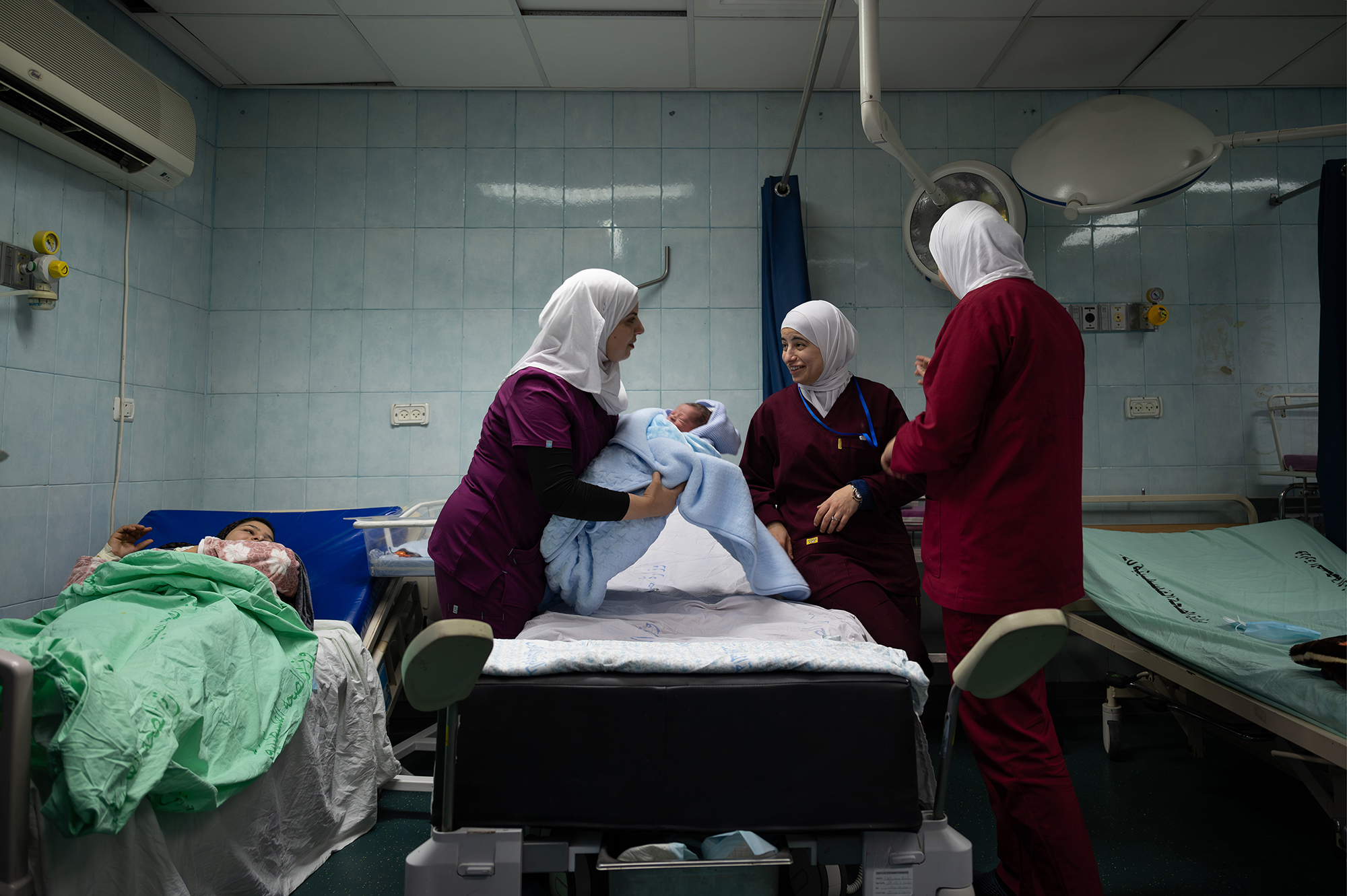
At the hospital, Rimawi heads over to a woman lying in the last bed on the ward and whispers comfortingly in her ear. Just a week earlier, the woman, Eman, had picked up matching outfits for the twins she was expecting: blue, with cars and clouds sprinkled across them. She had been trying for a child for nine years, and after several rounds of IVF, had become pregnant with two.
But one of the twins never wore his outfit. She shows it to me, still wrapped up in blue tissue paper in a gift bag grasped in her hands. There was a complication, and at 2 a.m. he was stillborn.
“If she got here sooner, I believe we could have saved him,” Rimawi says. “Before October, it would have only taken her 30 minutes to reach us. Now, it’s two hours to bring an emergency patient to Ramallah for treatment from her area…and this is in an ambulance. It’s much worse if the mothers are traveling in a private car.”
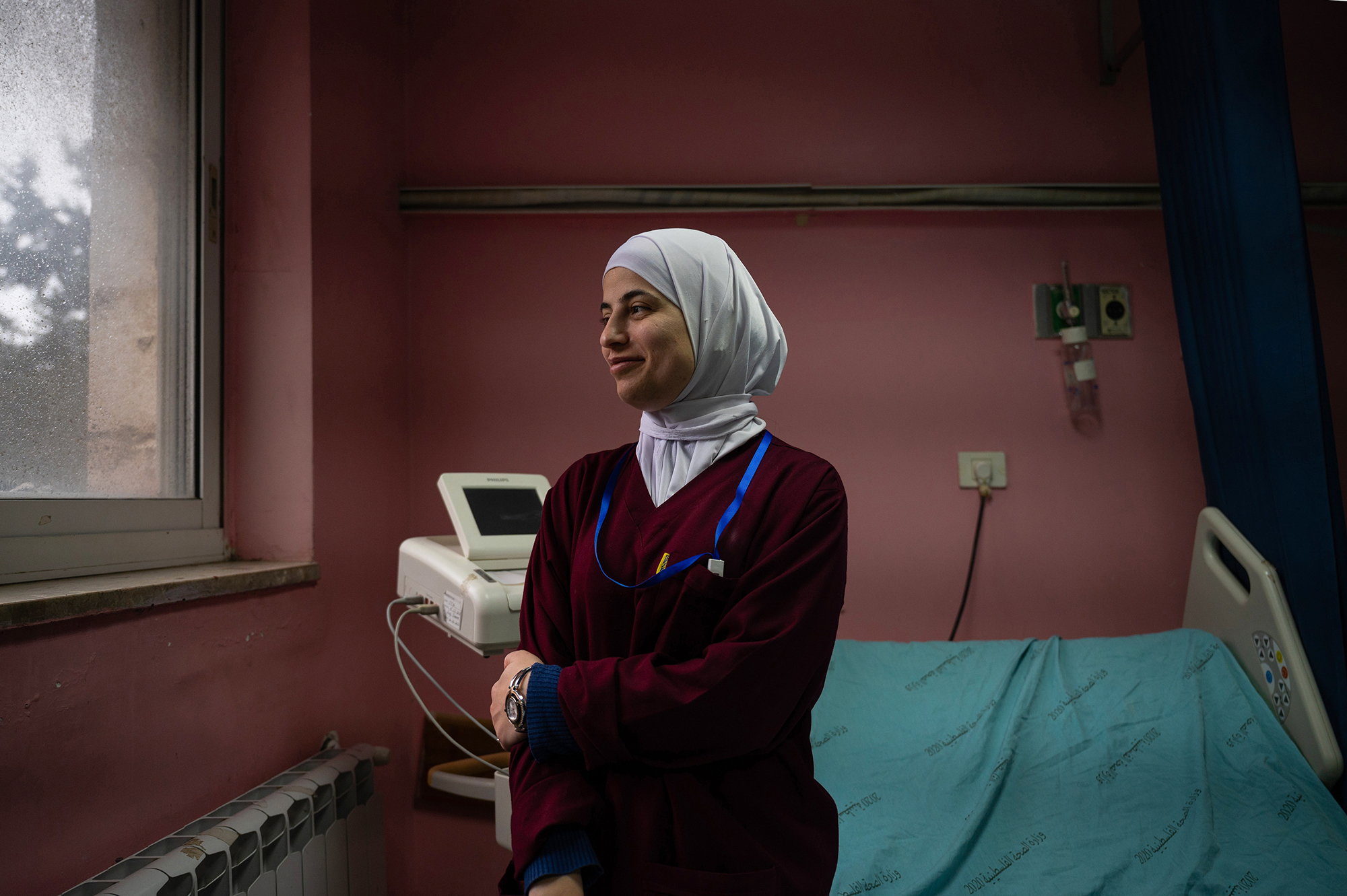
Expectant mothers I met on the maternity ward tell me they were waiting for hours, in labor, inching through checkpoints, while others found themselves turned back by unexpected road closures. One had given birth to her sixth child in the car at the checkpoint outside Ramallah where she had been stopped just weeks earlier. Few can afford the cost of an ambulance, which has doubled since October. Some pregnant women have started arriving at the hospital before their due date, Rimawi says, for fear of not being able to make it in time when they go into labor. “But there are not enough places for them, and we can’t do our job to the best of our capabilities, because there are just not enough midwives,” she says. Only two midwives work each shift, each one caring for about 15 women on the 11-bed maternity ward.
Masri of the Palestinian Ministry of Health says that the prevention of safe access to maternity wards threatens hard-won progress in the West Bank over the past two decades in getting women to give birth in medical facilities and will cause an increase in maternal morbidity and mortality. “This is a pure deprivation of women’s rights to be protected from preventable complications and death,” Masri says. Roughly 8,000 women are due to give birth across the West Bank in the next month, according to the Palestinian Ministry of Health, but there is no official system to provide help during planned home births.
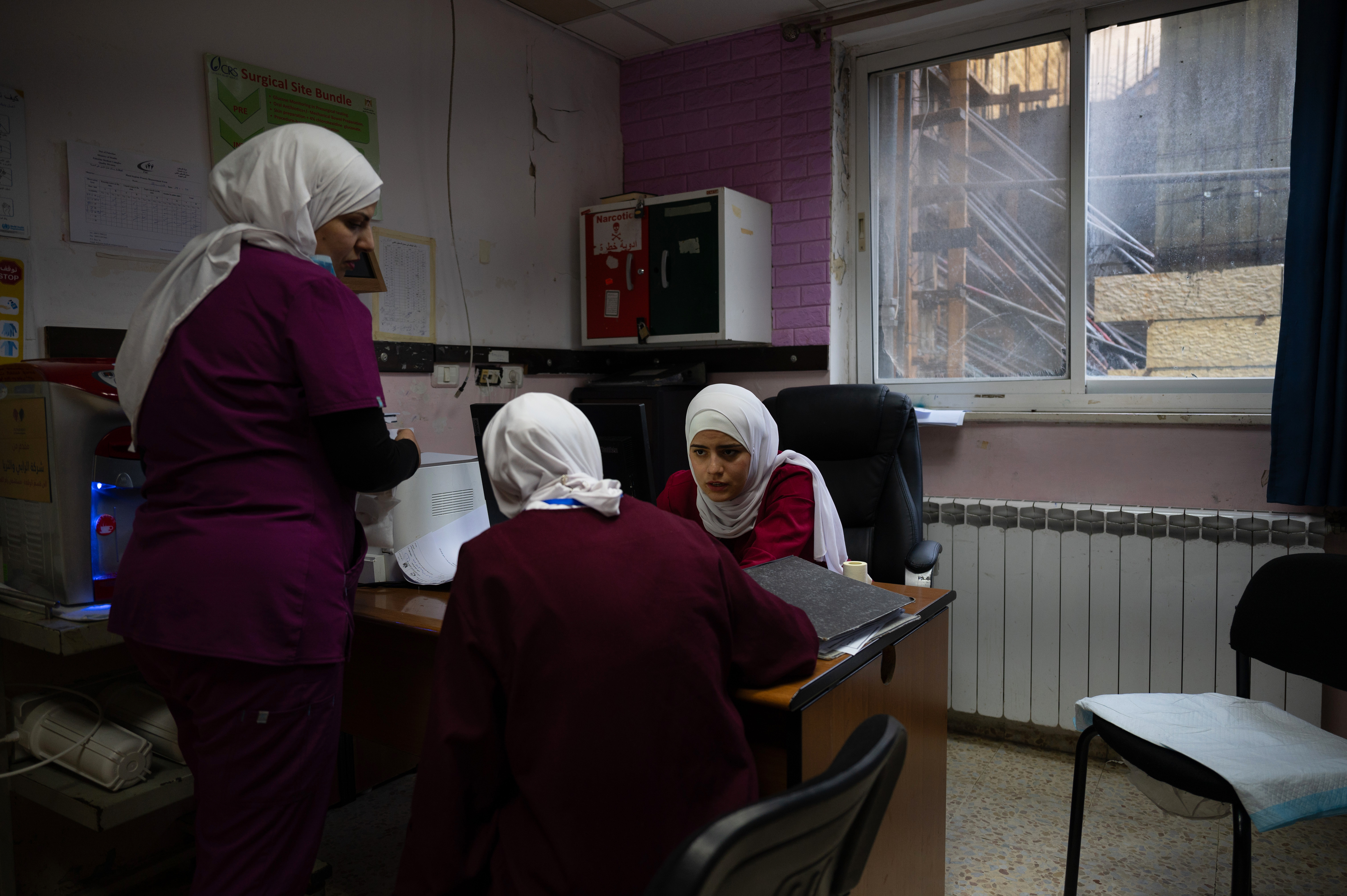
Because of deteriorating health care access, the Ministry of Health has implemented a new plan to provide some midwives in remote or closed areas of the West Bank with emergency medical delivery kits that include equipment and supplies for midwives to provide safe delivery for women who can’t reach health facilities. It is also establishing new emergency centers and mobile clinics so health workers can provide emergency care to pregnant mothers. While the ministry is trying to ensure that hospitals remain accessible, Masri says that “the attacks on the health facilities cannot be prevented.”
Many of the midwives I met volunteer in their communities after their shifts. Rimawi has been focused on trying to provide prenatal and postnatal care for women in her village who can’t reach the hospital: She recently started preparing to open her own clinic in Beit Rima, after gathering the funds to rent out a floor in a medical complex. “If it gets worse here, if they close more roads, we will be trapped, so I want the clinic ready so that if they completely close off my town, there will be a midwife there, ready to help mothers,” she says.
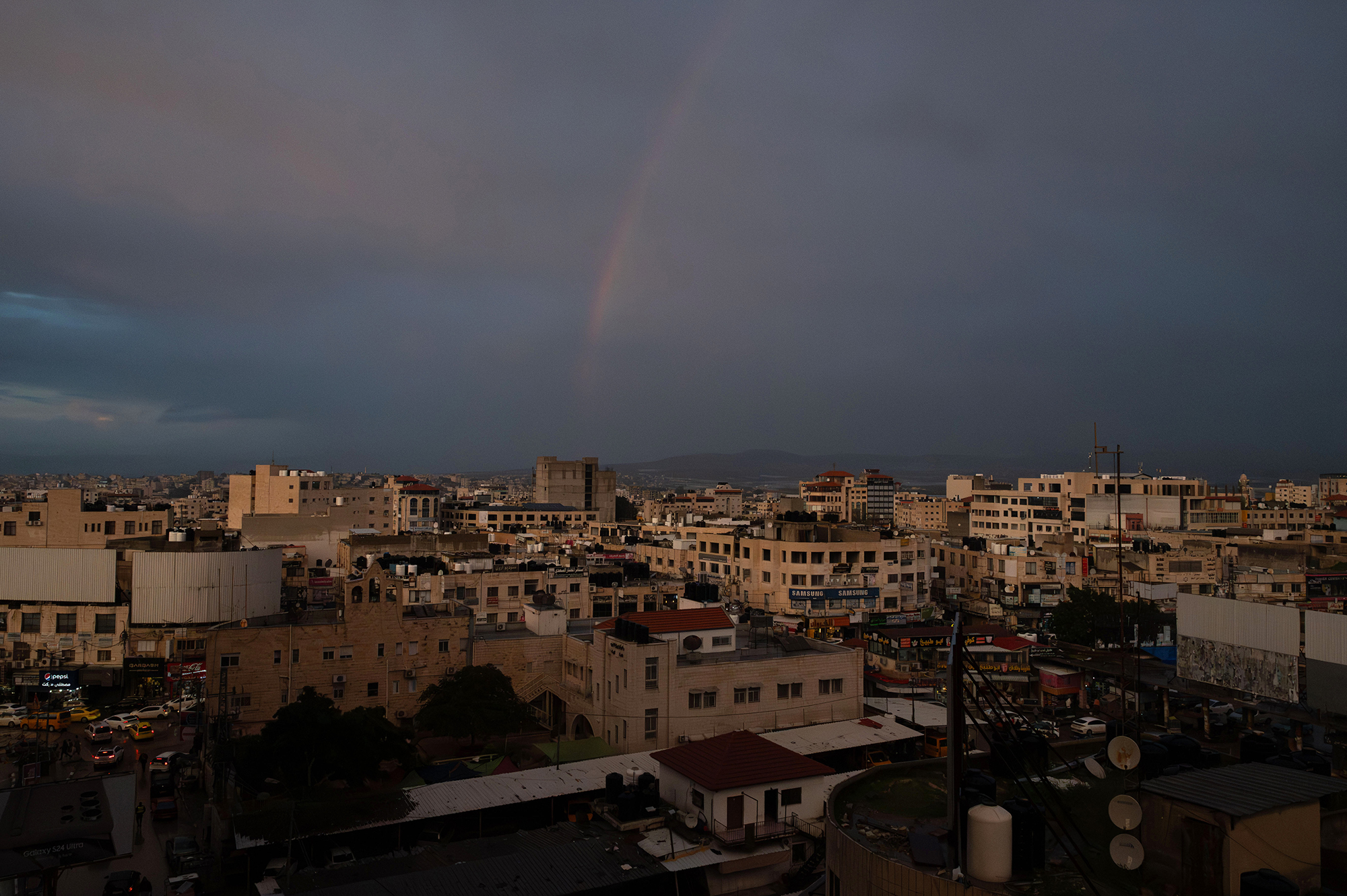
Jenin
Roughly 80 miles north, in Jenin, the three largest hospitals sit in the center of the city. Hospital workers in the city have long found themselves isolated when Israeli forces conduct raids in the neighboring Jenin refugee camp, blocking access to the hospitals from all sides. The camp, originally established in 1953 to house Palestinians who were expelled from their homes by Israeli forces during the Nakba, has emerged as a stronghold of armed resistance to the Israeli occupation, making it a target of frequent raids by Israeli forces.
In response to the October 7 Hamas attack, Israel escalated raids across the West Bank, including in the densely populated Jenin camp, carrying them out almost daily, with some raids lasting for days at a time. Israel says it is conducting search and arrest operations, looking for Palestinians with suspected ties to militant groups, and making hundreds of arrests. The raids across cities in the West Bank have left widespread damage, with Israeli forces repeatedly destroying property, ripping up roads with bulldozers, and leaving thousands injured.
Though attacks on medical workers in the West Bank are not new, a December report by Doctors Without Borders noted a dramatic increase in attacks against health care services in Jenin, part of a systemic disruption to Palestinian access to medical care, with Israeli forces surrounding the hospitals, blocking ambulances, and tear-gassing health care facilities. The Palestinian Red Crescent, a medical NGO, also reported that its paramedics had been wounded by gunfire when its ambulances were targeted during the raids in Jenin.
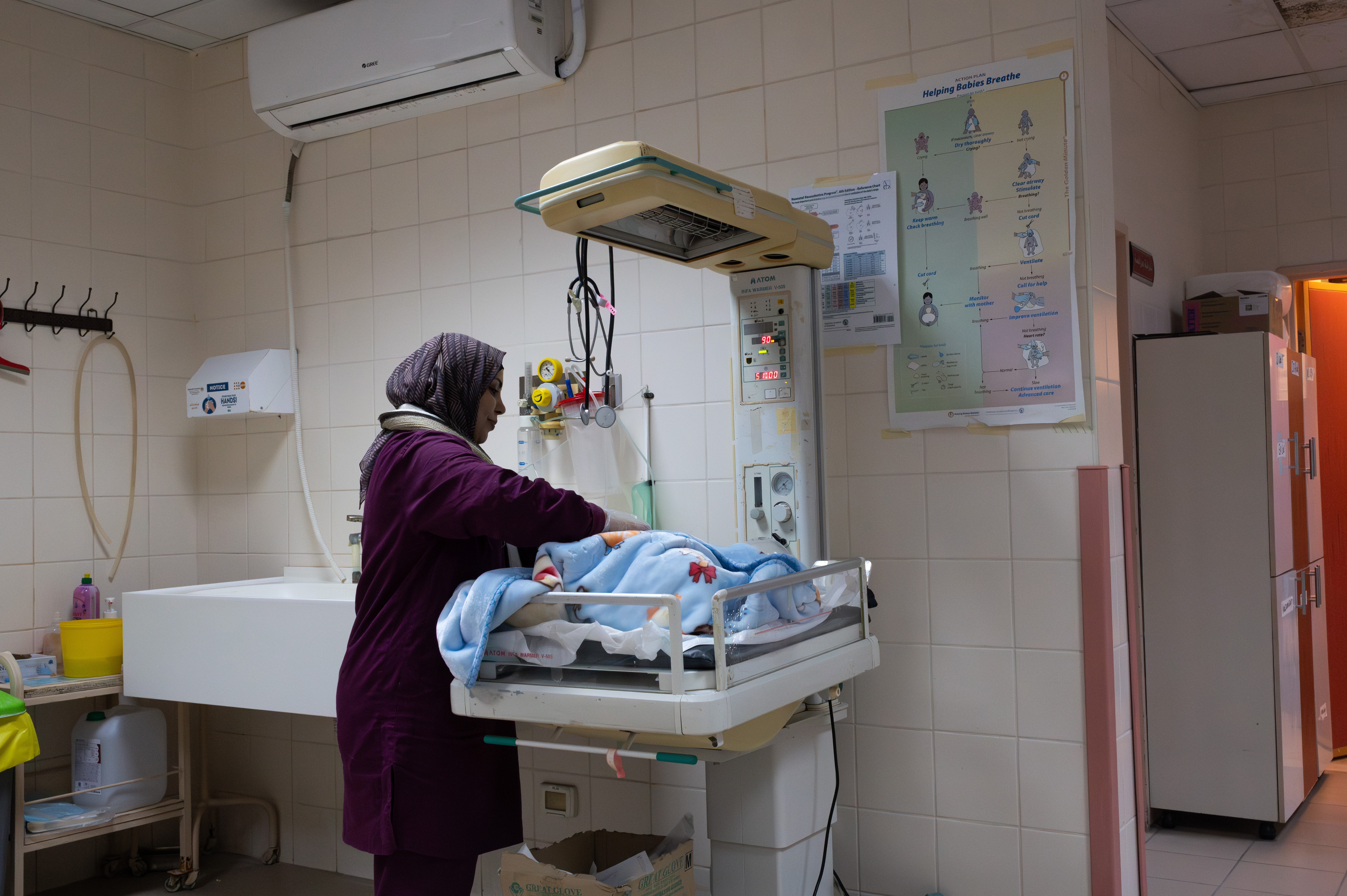
At Jenin Government Hospital, the busiest hospital in the city, I meet Maisa Kabaha, who has been a midwife here for 12 years. She shows me around the maternity ward, shouting over the buzz of the patients and their relatives trying to capture her attention. Around us, exhausted mothers prepare for the unpredictable journey home, while expectant mothers flood through the ward’s double doors, their husbands chancing a peek before the doors swing shut.
As the security and economic situation across the West Bank deteriorates, public hospitals in particular are feeling the strain. “More and more mothers are coming to government hospitals because they cannot afford the private hospitals anymore,” Kabaha says. “We are seeing twice as many births here now.” She tells me the hospital had 460 deliveries in the last month—but many more mothers were redirected to hospitals in other cities, she says, because her hospital just could not handle the number of births.
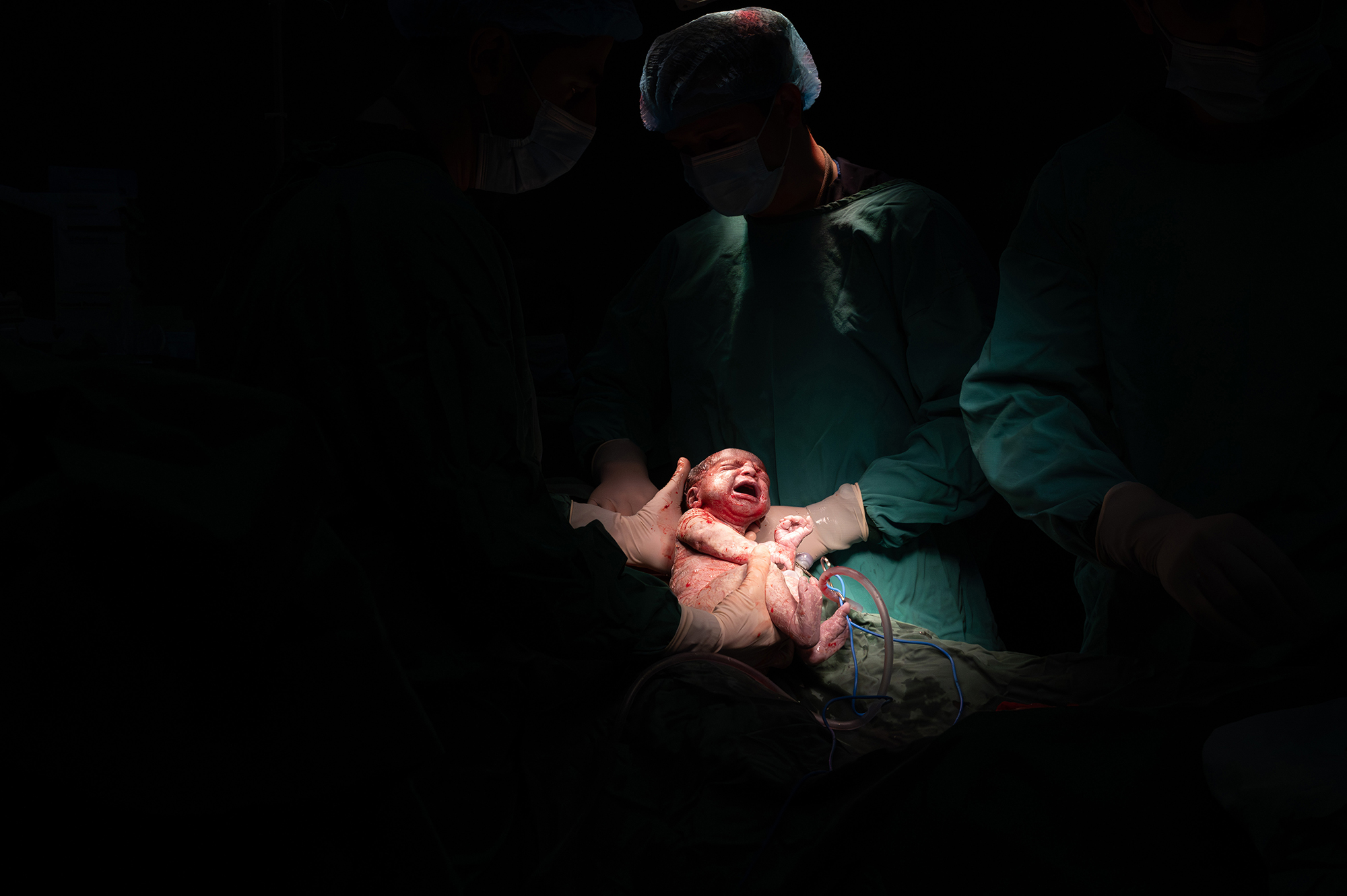
Kabaha says that today, almost half of the births in Jenin hospital are emergency cesarean sections. The long wait at checkpoints while in labor, and the stress of the situation, can cause serious complications for the mother and baby. “By the time the women arrive at the hospital, it has become an emergency case,” she says. Others do not make it in time: The Palestinian Ministry of Health says that Israeli forces at checkpoints often prevent mothers from reaching hospitals. Since October 7, the WHO has documented at least one case of a woman giving birth at a checkpoint. Kabaha and other midwives I spoke to said that women and babies had died at checkpoints in the past—during the second intifada in the early 2000s, 35 newborns and five women died during childbirth at checkpoints.
“We often find that we do not have enough beds or cots available on the NICU for premature babies,” Kabaha says. “And we struggle to transfer patients.” Some mothers risk giving birth on the way to another hospital while trying to find an available bed. The hospital is now trying to send a midwife or pediatrician in the ambulances to provide care in case anything happens on the road, she says. As we speak, she’s distracted and jittery, shifting from one foot to another. She tells me that she wants to make it home to her children, before the checkpoint on her route closes. She lives in Toura, on the Green Line between Israel and the West Bank and often finds herself staying at the hospital beyond her usual double shift. Drivers can only pass through the checkpoint at certain hours, so if she can’t make it in time, or if the checkpoint is unexpectedly closed because of raids in and around her home village, she’ll be stuck at the hospital.
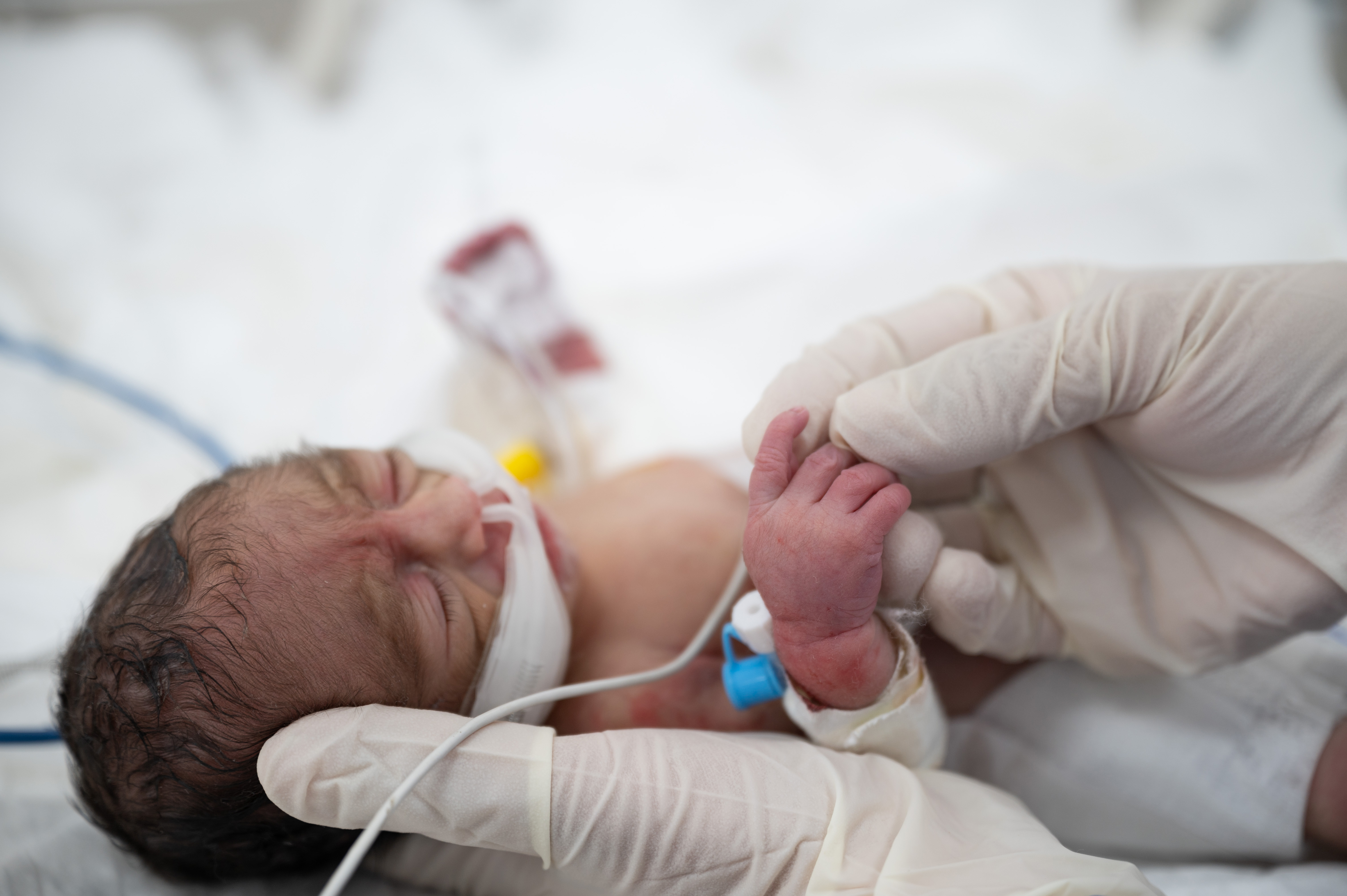
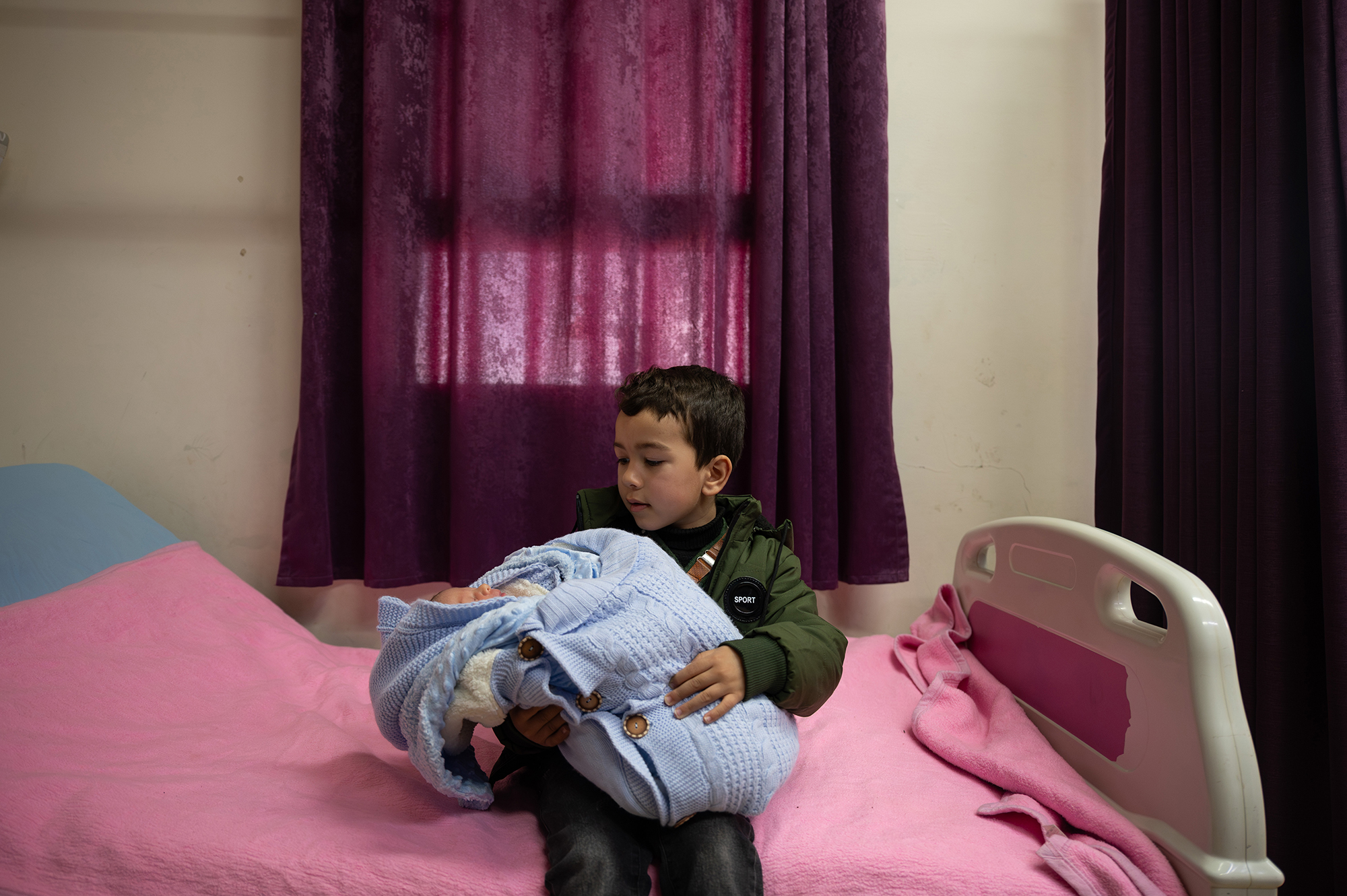
Private hospitals, too, have become a microcosm of the conflict. On January 30, Israeli agents dressed as doctors and wearing women’s clothes stormed Ibn Sina Specialized Hospital in Jenin. They shot and killed three patients, one who Hamas claimed as a member, and two who were claimed as members by the militant group Islamic Jihad. Twenty-year-old Ayah Bsharat was on shift that day and asleep in the midwives’ changing room when she heard the commotion. I visit her just four days after the attack.
“This is our normal,” she says. ”It is routine now.” She shrugs but her voice wavers, betraying her composure. Hospitals in Jenin have been targeted multiple times by Israeli forces over the past year, including in a three-day operation last summer that at the time was the biggest IDF raid in the occupied West Bank for 20 years.
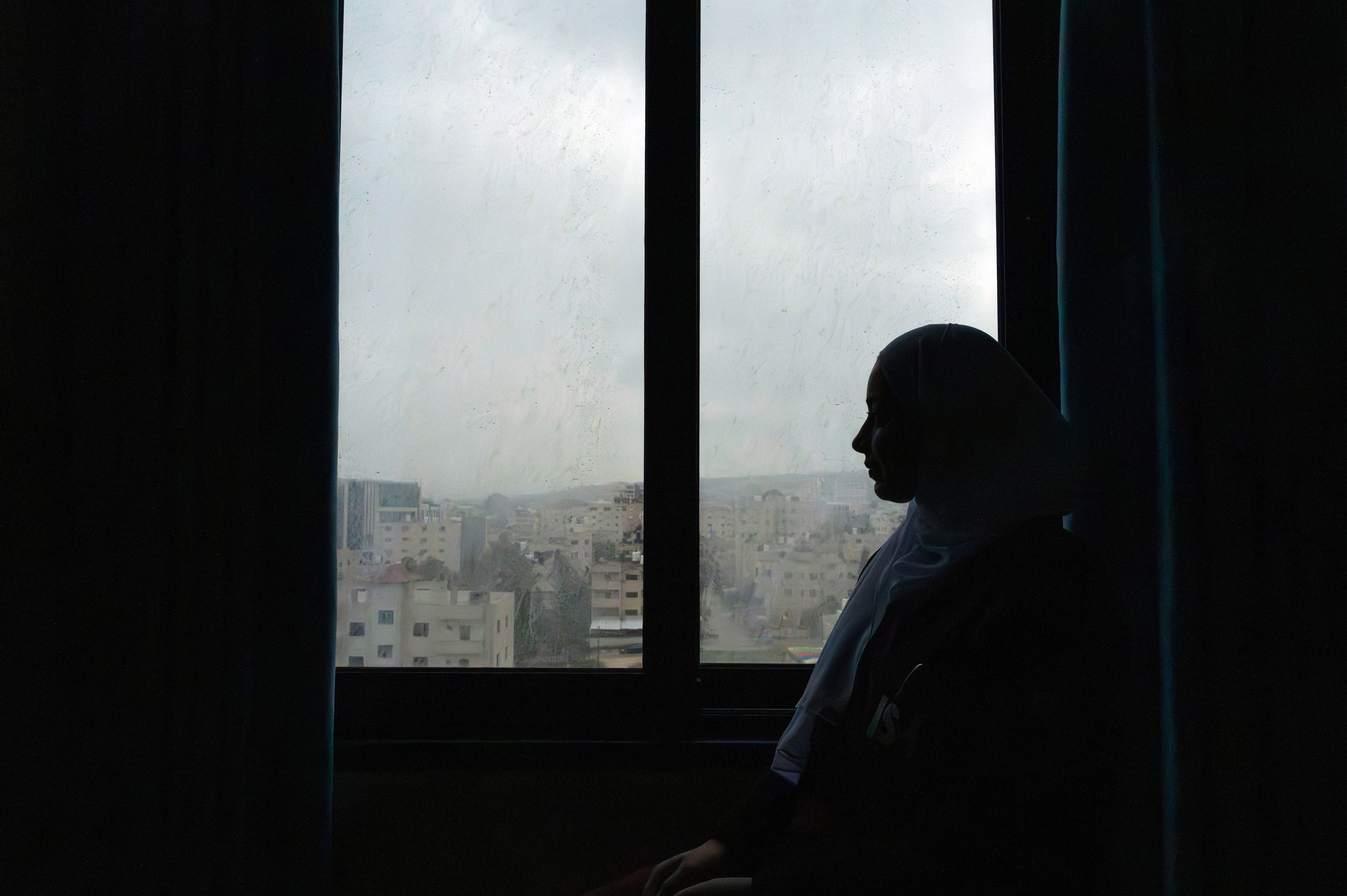
On the ward, Bsharat is caring for Afnan Abuisa, a mother from Gaza who traveled to the West Bank almost nine months ago to give birth to her triplets, Adbul Rahman, Sabah, and Tahseen. Since she’s unable to return to her husband, now in Rafah, the midwives here have given her and her babies a place to live, free of charge.
Most of the midwives working here live outside Jenin, and there is no way to get to the hospital during the raids on the camp. “We used to call and ask for an ambulance to come over to pick us up,” she says, “but now even the ambulance cannot come.” When she can’t get home, she stays in the birth suites with Abuisa.
“You never know what is going to happen here but when we see the baby in its first moments of life, and we share that moment with the parents, especially if it’s after an infertility struggle, after IVF and all the effort, it’s such a beautiful moment to participate in,” she says.
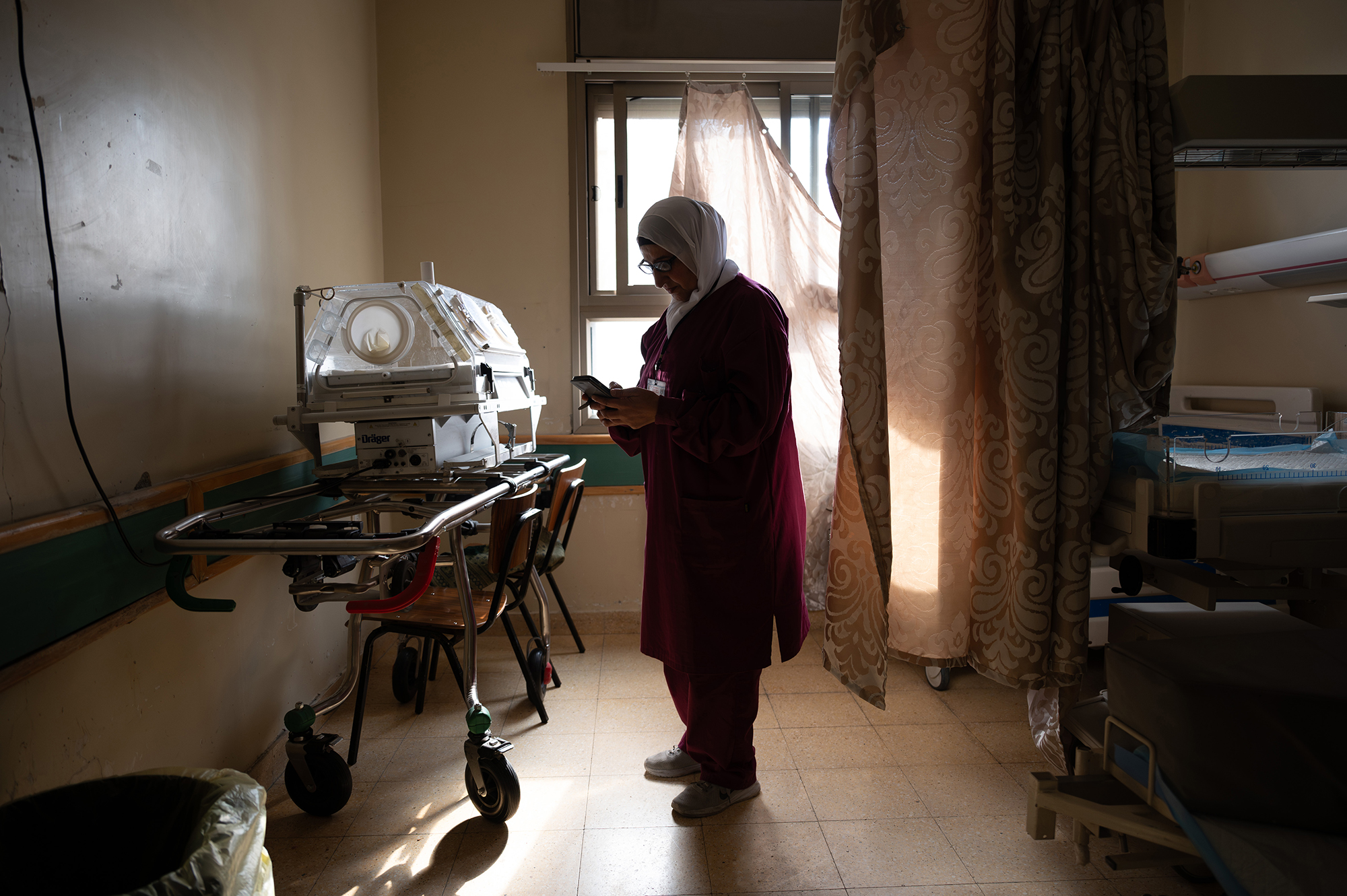
Despite the support and camaraderie from her fellow midwives, Bsharat is struggling with the weight of the violence that surrounds her. None of the staff in the hospital feel safe, she says. “The biggest struggle we face right now is our security. We are not safe at home or at work.”
“Even if we pretend we are okay, we are not okay,” she says, starting out at the city from the third floor of Ibn Sina. “It’s an ongoing trauma, for us, for our children, for our parents, for the whole community.”

